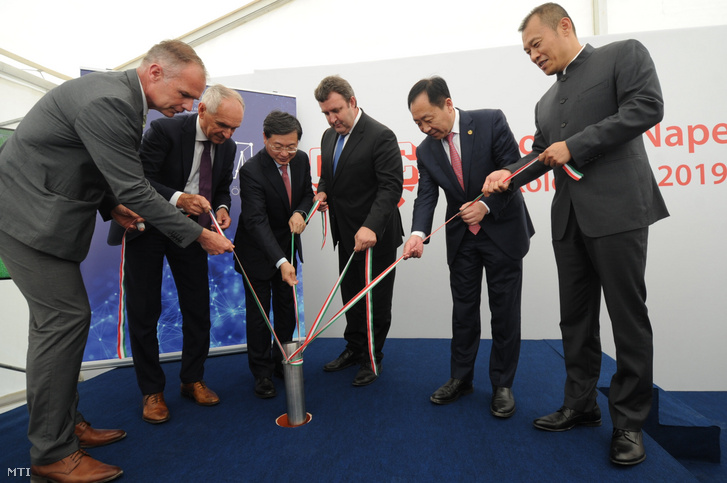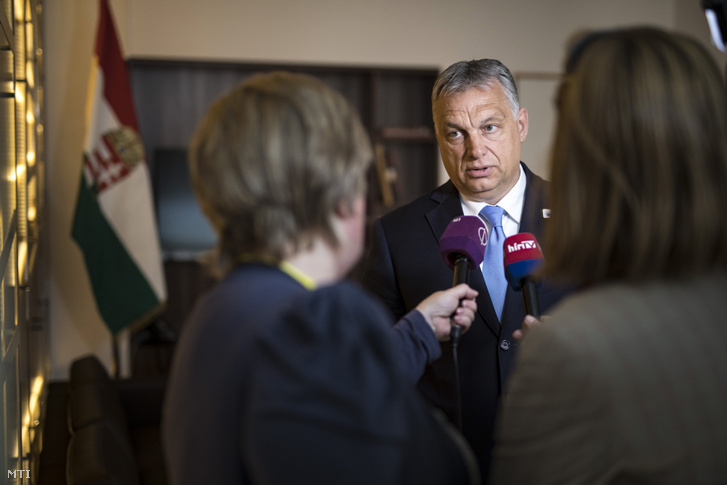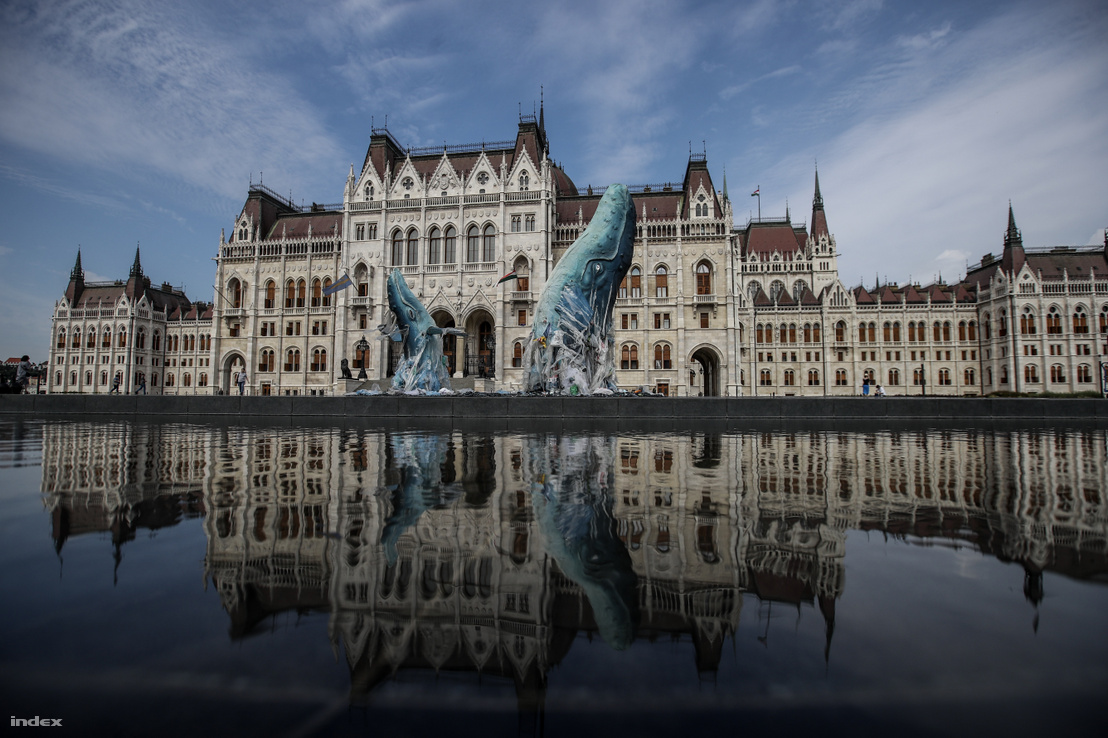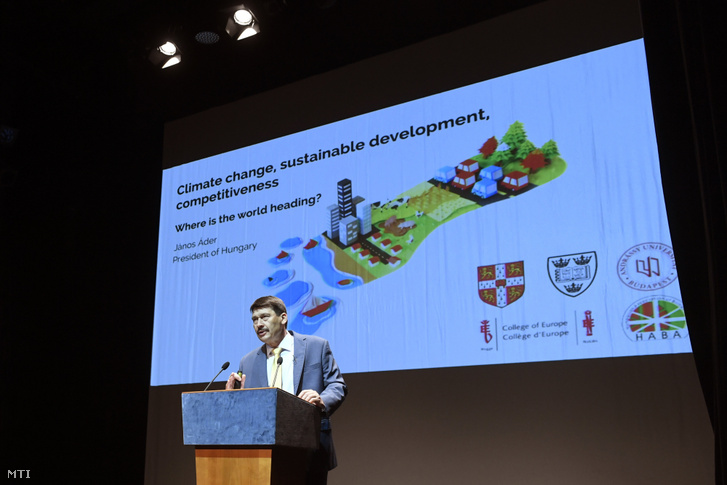What is behind Viktor Orbán's climate change doublethink?

- Four days before Hungarian PM Viktor Orbán vetoed the EU's 2050 carbon neutrality goals, one of his ministers publicly stated that the Hungarian government's goal is to achieve carbon neutrality before 2050.
- The year-long EU-wide negotiations and policy options were overwritten by Orbán's short-term political goals concerning the EU's next seven-year budget and the Finnish EU Council presidency.
- The PM maintains that the fight against climate change is just left-wing trickery made up by Barack Obama to mess with Putin, and he does not believe climate change is caused by human activity.
- Besides his personal views, there are economic and political considerations that drive Orbán to prevent climate change from becoming a central topic of public discourse in Hungary.
On 17 June 2019, at a formal ceremony attended by Hungarian Minister of Innovation László Palkovics, the China National Machinery Import&Export Company had laid the foundational stone of a 100-megawatt solar plant. In his speech there, Palkovics said that the project supports Hungary's climate policy goals and helps Hungary in becoming a country that produces the energy it uses in a carbon-neutral way.

In retrospect, the statement of the Minister reflects a rather unusual cacophony of views within the Hungarian government with regards to climate policy, as only four days later, on 21 June, Viktor Orbán blocked the EU's goal to achieve carbon neutrality by 2050.
Money and bargaining
The PM's veto generated quite a bit of confusion within the Hungarian government and in governments abroad, as the EU's proposed (and failed) climate deal was a result of a year-long negotiation process of EU ministers, and those with insight over this process all said that Hungary remained positive towards the question of carbon neutrality all throughout the talks.
After Orbán's veto, it was a common joke amongst the Hungarian government's climate experts that he accidentally read the Polish PM's prepared statement at the summit (as due to Poland's still significant coal industry, they are the fiercest opponents of carbon neutrality), but many of them have questioned if working on climate policies in the Hungarian administration is not completely futile after that point.
Another one of our government sources said that working in the administration necessitates the flexibility to allow politics to influence policy. As this source told us, this decision takes perspectives of both policy and politics into account, as Orbán did not block carbon neutrality itself (as that remains part of the resolution accepted by the Council), "only" the target date. As our source said:
"Climate policy sometimes gives me a feeling as if we are building communism, we have to be done by 2050. Nobody knows what will happen then, but it has to be done."
According to the official reasoning, achieving carbon neutrality by 2050 would have huge costs and would put a great burden on the Hungarian industry. "We cannot responsibly support said proposal as long as we do not know what funds the European Union can make available for modernising industry," the press release of the Cabinet Ministry read, adding that it's the government's responsibility to keep utility costs low for Hungarian families. The Government later added that if utility costs would increase as much as they did in Germany, it would cost Hungary its political stability.

Our sources say that blocking the 2050 carbon neutrality goal was mostly about achieving and funding of the 2030 goals: "It will only be sensible to talk about 2050 once we are able to achieve the 2030 goals." The government's calculations show that the investments necessary to reach the 2030 goals would cost around €50-100 billion, while the proposal for the 2021-2027 cohesion funds lowers the EU co-financing of green projects from 30% to 10%. Besides that, they also think that the cohesion funds allocated to Hungary would drop by 25% compared to the previous period.
What Orbán's government is trying to achieve is to get the European Union to contribute to reaching green goals as much as they did so far, and also to avoid the project-based distribution of cohesion funds and tying payments to certain conditions (as several member states would prefer), they would like to keep the decisionmaking process on Hungarian use of EU money in Budapest. The veto of the climate deal is also a message to the Finnish EU presidency, for whom climate protection is a priority, and Orbán wants to leverage that in order to get more leniency on rule-of-law questions.
Trolls are analysing climate policy
Another reason for tensions within the Hungarian administration is that the political perspective on this question enjoys significant preference over professional considerations. In the communications universe of Fidesz, the opinions that get the most airtime are from the talking heads who say that the whole climate topic is the opiate of the West, that it's a ruse by the elites, and that its only in the focus of public interest due to the manipulations of the brainwashing media.
Several government stakeholders think that this kind of communication has nothing to do with the actual work that is being done with regards to the topic: Regionally, the funds provided for climate policy are sufficient, though the number of administration workers dealing with climate policy is five times as much in Norway than in Hungary.
A number of policymakers are bothered by the fact that Fidesz's communication about climate change does not reflect what the ministries have worked out, instead, the limelight is on trolls, leading to accusations of climate change scepticism. A high-ranking source added that though there are indeed politicians on the right who do not believe that climate change is a real and significant problem, however, their numbers may be diminishing.
Another government official stated that these "rougher political comments" are due to the fact that with regards to climate change, Fidesz is under pressure to act: "It became apparent before the European elections that the main topic of one side is migration, while the other has climate change, therefore it is no longer only a professional matter, but also a political one. We cannot pat our opponent on the back and say yes, we should do as you say."
Protecting the environment hinders industrialisation
Our sources working on different levels of the government all said that it is a conscious decision that Fidesz does not want to elevate climate change to be a central topic of Hungarian public discourse. The number one reason for this is that surveys show that Hungarians are not that interested in it, secondly, Orbán sees it mostly as a "left-wing cause, the trickery of rich countries."

A couple of years ago Orbán held an entire lecture on climate change to a select audience: He said Obama made up the global action against climate change just to put Putin in a bad situation; renewables would prevent Russia from selling natural gas to Europe, and poor countries would have to spend money on those instead of trying to keep up with the development of richer countries, therefore cementing the hegemony of the USA.
"I am not convinced that he thinks the current warming is caused by human activities, though regardless of whether or not he believes that to be true, he maintains that action against it is useful,"
as one of Orbán's colleagues said about the PM.
The other grudge Orbán holds against the protection of the environment is that it hinders industrial development. Since 2010, the PM often told circles close to him several times that he would not like green organisations and perspectives to limit the industrialisation of Hungary. Allegedly, the PM has directly said after 2010 that he wishes to cut back environmental protection administration, which, looking back, he did manage to do.
Before 2010, the Government had a separate Ministry of Environmental Protection with approximately 450 employees, but this portfolio was transferred over to a state secretariat responsible for environmental and natural protection and water policy, working with 150 people under the Ministry of Rural Development. After the Ministry's portfolio was diminished to only be the Ministry of Agriculture, today there is only a state secretariat responsible for environmental policy, and the government's latest measures to cut down on bureaucracy basically decapitated the state's nature protection infrastructure.
Orbán's double game
Besides economic considerations, Orbán has a strong dislike for the topic of climate change for political reasons as well, as it is useless for creating partisan division. For years, Fidesz was looking for topics that speak to everyone but on which parties strongly disagree. Such a topic, for instance, is migration: around 80% of people agree with Orbán's opinion on it, however, none of the opposition parties do.
Politicians of the ruling party told us that the problem with fighting climate change is that it's not only important in the eyes of right- and left-wing voters, but opposition parties also think it is a significant cause. "God forbid that the socialists agree with us. If you can't rile your own base up, they will not vote. If you protect the environment, that is not good, because other parties will agree with you," as a member of Fidesz explained to us.

Though people who know Orbán say that for him, climate change is a huge pain in the back, he is forced to say that it's an important cause that requires action, as he sees that this view is unstoppably coming from the West and from the media. The question interests people more and more, and he has to take preventive measures before a party puts it on their flag and beats Fidesz by having a radically different position than them.
Many in Fidesz think that climate change could become a political cause similar to environmental protection in the 80s: not just a matter of policy, but the harshest criticism of the current political system.
Sensing this potential danger, Fidesz performs a dual strategy: Orbán says climate change is an important issue, but the talking heads keep murmuring that this is all just a ruse to direct attention away from migration, while dressing ongoing projects (such as the planned Paks 2 nuclear power plant) as measures taken to control climate change, while János Áder tells tales of water policy to high schoolers to make them believe that Fidesz is actively tackling climate change.
This article is a direct translation of the original published in Hungarian by Index.

Support the independent media!
The English section of Index is financed from donations.


